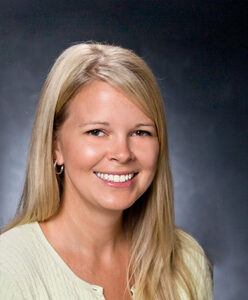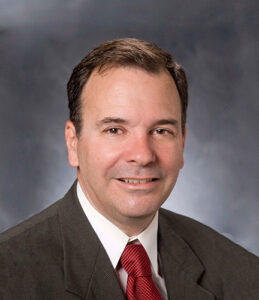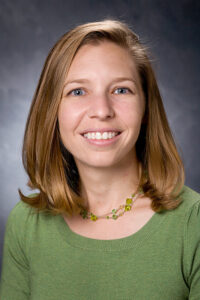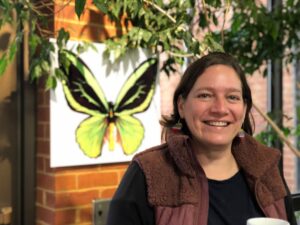The Office of Instruction announces four faculty recipients of the 2022 Creative Teaching Award: Jillian Bohlen (Animal and Dairy Science), Keith L. Dougherty (Political Science), Jennifer L. Gay (Health Promotion and Behavior) and Amanda Rugenski (Ecology).
The Creative Teaching Awards are presented annually on behalf of the Office of Instruction to faculty who have demonstrated exceptional creativity in using either an innovative technology or pedagogy that extends learning beyond the traditional classroom or for their creative course design or implementation of subject matter that improves student learning outcomes in their courses.

Jillian Bohlen, an associate professor in the College of Agricultural and Environmental Sciences, is reinventing how students learn at the UGA Dairy. In Bohlen’s Jersey Active Management by Students program, students get hands-on experience in the dairy business. Students select the animals from the herd, make all mating selections, consult on nutrition and perform genomic testing. Students make thoughtful decisions to improve the herd. Each semester, Bohlen and the students choose their top three priorities—for example, milk production, fat percentage, type, reproductive traits or productive life—then pick the best bulls to represent those priorities, which has resulted in a well-rounded herd.

Keith L. Dougherty, a professor in the School of Public and International Affairs, gets students interested in American government and politics through innovative in-class experiments, debates, simulations and other active learning techniques. His “trust game” helps students easily master topics and can be adapted to other courses. Students rave about his methods in course evaluations: “Dr. Dougherty is the best professor I’ve had at UGA. The course was not easy, which should speak very highly of how great a professor he is since the course was difficult and his students still admire him. The methods that he used to teach were incredibly helpful and really furthered my learning.”

Jennifer L. Gay, an associate professor in the College of Public Health, uses supportive coaching and small learning milestones to help students learn needed skills. In her inclusive class, students can “choose their own adventure” for project topics. They set the knowledge, skills and degree of competence they would like to pursue. In each module, students submit practice assignments that prime them for the successful completion of a semester-long project. Each assignment receives extensive feedback, and if competency has not been reached, the student can try again, incorporating the feedback into their revision, until they establish competence. By learning from revisions, students establish a mastery of the subject matter.

Amanda Rugenski, a lecturer in the Odum School of Ecology, has fundamentally transformed the ecology teaching curriculum. She developed an innovative adaptation of a required capstone field course, ECOL 3300, “Field Program in Ecological Problem Solving,” which has become a hallmark of the Odum School’s experiential education. This Maymester course normally takes 20 students across Georgia. During spring 2021, she turned the course into a “virtual field program,” where students worked with actual stakeholders from the Apalachicola, Chattahoochee and Flint rivers to identify challenges and design solutions for societal and environmental issues in urban, rural and coastal ecosystems in Georgia—all while staying in Athens.


